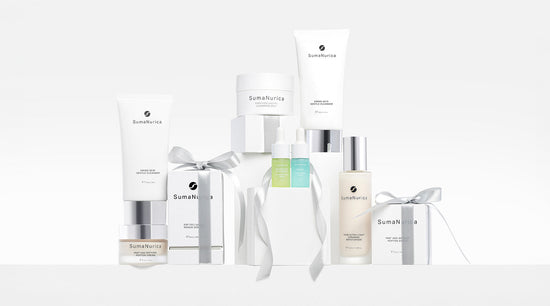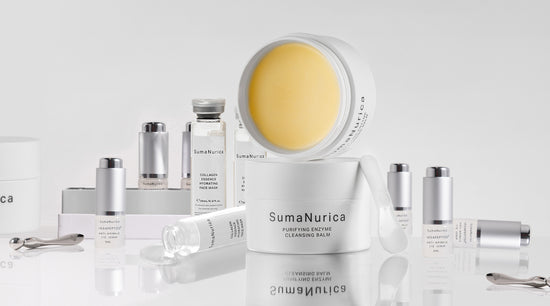Your Guide To Combination Skin
Combination skin, whilst one of the more common skin types, is often vaguely defined and can be challenging to identify. It can often be mistaken for oily or dry skin - but we're here to help you identify the signs of combination skin and whether you may have this skin type. We'll walk you through your ideal skin care routine, plus our recommended skin care products for combination skin to ensure your skin stays balanced, healthy, and glowing all year round.
What is Combination Skin?
Combination skin is characterised by having excess oil in some areas of the face (usually an oily T-Zone – your forehead, nose, and chin) – but dry areas at the same time, usually around the cheeks and jawline. Oil levels on the skin can also change depending on the seasons – for example, your skin may produce more oil during the summer and feel drier during the Winter months.
How Do I Know If I Have Combination Skin?
Signs of combination skin include:
Your T-Zone (forehead, nose, chin – usually in a "T" shape) appears shinier than the other areas of the face
You may experience dry skin or even rough, dry patches in certain areas like the cheeks and jawline
You may be more prone to breakouts than other skin types – if you experience acne but your skin still feels dry, you may have combination skin.
Your cheeks and jawline can feel tight or dry after cleansing
You may have more extensive or more clogged pores or around your T zone than on your cheeks
Your skin feels oilier during warmer months and dry during cold months
What Causes Combination Skin?
Usually, genetics will determine your skin type, but external factors can also influence it. Factors like sleep, stress levels, harsh or irritating skin care products, and the weather can all play a part in causing your skin's oil levels to become imbalanced.
Best Skin Care Routine For Combination Skin
If you have combination skin, there are steps you can follow to help balance out your skin's oil levels, soothing dry areas and helping to prevent excess oil production on your T-Zone. There are also certain things to keep in mind when thinking about the best skin care products to use
Use a gentle cleanser twice a day
It is essential to cleanse combination skin morning and night – in the morning to wash away any buildup of dead skin cells and excess oil, and at night to remove any dirt, makeup, and oil buildup from the day.
What is the best cleanser for combination skin?
Try to choose a gel cleanser that contains salicylic acid, which will help to remove dead skin cells and excess oil. Avoid harsh stripping ingredients that cause the skin to feel dry or tight after cleansing – removing too much of the skin's natural moisture will only cause the skin to overproduce oil, so be gentle.
Exfoliate once a week
One of the common mistakes people with combination skin make is over-exfoliating, which will irritate the drier areas of the skin and won't help reduce excess oil. However, using a chemical (rather than a physical) exfoliator once a week can help reduce skin buildup, leaving the complexion clean, clear, and ready for hydration.
What is the best exfoliator for combination skin?
We recommend looking for a chemical exfoliator with ingredients such as retinol, which can help to reduce oil, lactic acid, which gently clears pores, and salicylic acid, a gentle exfoliator that effectively removes dead skin cells.
Moisturise twice daily
Those with Combination Skin mustn't skip moisturising. Keeping the skin hydrated with a good quality moisturiser after cleansing will soothe any dry patches and help to calm any oily patches by providing essential moisture and a protective barrier on the skin.
What is the best moisturiser for combination skin?
Look for oil-free products for the daytime, such as a lightweight, water-based moisturiser to replenish the skin's hydration without causing extra oiliness. At night, a richer formula can be used to nourish the skin overnight. Look for ingredients like hyaluronic acid, which helps the skin retain moisture without adding oil (and don't forget your SPF sun protection during the day!).
Use a face mask at least once a week
Those with combination skin must keep their skin hydrated – this will help it stay calm, balanced, and healthy.
What is the best face mask for combination skin?
We recommend using a high-quality face mask to maximise hydration, such as our Collagen Essence Hydrating Face Mask. Developed to be suitable for all skin types, this face mask is formulated with our unique scientifically developed synthesised collagen protein designed to be as close as possible to the collagen naturally found in our skin. This collagen essence acts as an ultra-hydrating barrier that helps restore skin moisture and elasticity and helps reduce redness, inflammation and irritation that those with combination skin can often experience.
Use once or twice a week for your ultimate healthy skin that will be happy, hydrated, and balanced.
Experience The New Era Of Skin
Loved learning about the world of skincare? Find more articles like this one in our learning center here.
Want to start your SumaNurica skincare journey? Shop our entire SumaNurica range here.
Question not answered? Or want to speak to one of our friendly skincare experts? Head to our live chat in the bottom right corner and a skin specialist will be there to assist with all your skincare questions and concerns.







